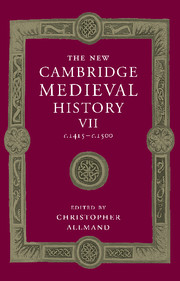Book contents
- Frontmatter
- PART I GOVERNMENT
- PART II ECONOMIC AND SOCIAL DEVELOPMENTS
- PART III SPIRITUAL, CULTURAL AND ARTISTIC LIFE
- PART IV THE DEVELOPMENT OF EUROPEAN STATES
- 17 Germany and the Empire
- 18 Hus, the Hussites and Bohemia
- 19 France
- 20 Burgundy
- 21 England
- 22 The Celtic world
- 23 Italy
- (a) The Northern Italian States
- (b) The Papal States and the Kingdom of Naples
- 24 The Iberian peninsula
- 25 The Swiss Confederation
- 26 The States of Scandinavia, c. 1390– c. 1536
- 27 Hungary: Crown and Estates
- 28 The Kingdom of Poland and the Grand Duchy of Lithuania, 1370–1506
- 29 Russia
- 30 Byzantium: The Roman Orthodox World, 1393–1492
- 31 The Latin East
- 32 The Ottoman World
- 33 Conclusion
- Appendix Genealogical Tables
- Primary Sources and Secondary Works Arranged by Chapter
- Index
- Frontispiece
- Plate section
- Map 1 European towns in the late Middle Ages
- Map 2 European commerce and trade
- Map 4 Winds and currents facilitating the discoveries
- Map 5 The universities o f Europe in 1400 and 1500
- Map 6 Germany and the Empire
- Map 20 The Roman Orthodox and Ottoman worlds in the fifteenth century
- References
(a) - The Northern Italian States
from 23 - Italy
Published online by Cambridge University Press: 28 March 2008
- Frontmatter
- PART I GOVERNMENT
- PART II ECONOMIC AND SOCIAL DEVELOPMENTS
- PART III SPIRITUAL, CULTURAL AND ARTISTIC LIFE
- PART IV THE DEVELOPMENT OF EUROPEAN STATES
- 17 Germany and the Empire
- 18 Hus, the Hussites and Bohemia
- 19 France
- 20 Burgundy
- 21 England
- 22 The Celtic world
- 23 Italy
- (a) The Northern Italian States
- (b) The Papal States and the Kingdom of Naples
- 24 The Iberian peninsula
- 25 The Swiss Confederation
- 26 The States of Scandinavia, c. 1390– c. 1536
- 27 Hungary: Crown and Estates
- 28 The Kingdom of Poland and the Grand Duchy of Lithuania, 1370–1506
- 29 Russia
- 30 Byzantium: The Roman Orthodox World, 1393–1492
- 31 The Latin East
- 32 The Ottoman World
- 33 Conclusion
- Appendix Genealogical Tables
- Primary Sources and Secondary Works Arranged by Chapter
- Index
- Frontispiece
- Plate section
- Map 1 European towns in the late Middle Ages
- Map 2 European commerce and trade
- Map 4 Winds and currents facilitating the discoveries
- Map 5 The universities o f Europe in 1400 and 1500
- Map 6 Germany and the Empire
- Map 20 The Roman Orthodox and Ottoman worlds in the fifteenth century
- References
Summary
in many respects Italy in the fifteenth century was becoming a more coherent political area and it is hard to confine discussion to the northern part of the peninsula, without reference to the pope or to the king of Naples. The inter-relationships between increasingly powerful and organised states are a key part of the history of the period. Even the tensions and fears that seemed to grow in the second half of the century as outside powers, France, the Spanish kingdoms, the emperor, and above all the Ottomans, gathered their strength, were felt by all the Italian states. Thus, while this chapter will focus on the Milanese, Venetian and Florentine states and the smaller satellites around them, the wider Italy, increasingly sharing the same experiences, expectations and fears, cannot be excluded.
A main cause of uncertainty, and even gloom, both amongst contemporaries and amongst recent historians, has been the economic condition of the Italian states. An ‘economic depression of the Renaissance’, following the demographic disasters of the fourteenth century and lasting through much of the fifteenth century has been seen as accompanying, and indeed possibly contributing to, the extraordinary cultural flowering of Italy in this period. An atmosphere of cautious economic pessimism is thought to have resulted from a steep decline in Genoese trading activity, an apparent dramatic collapse in Florentine woollen cloth production and a lowering of levels of investment in banks. These are issues which have been much debated without any very clear consensus emerging. There have undoubtedly been exaggerations in the depressionist arguments; Genoa’s retreat from the eastern Mediterranean was matched by renewed advantage for Venice.
Keywords
- Type
- Chapter
- Information
- The New Cambridge Medieval History , pp. 547 - 570Publisher: Cambridge University PressPrint publication year: 1998
References
- 1
- Cited by



